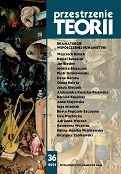Joanna the Wife of Chuza by Lesya Ukrainka as a New Model of Communication in Modern Ukrainian Literature
Joanna the Wife of Chuza by Lesya Ukrainka as a New Model of Communication in Modern Ukrainian Literature
Author(s): Olena HaletaSubject(s): Studies of Literature, Ukrainian Literature, Theory of Literature
Published by: Uniwersytet Adama Mickiewicza
Keywords: Lesya Ukrainka; reader-response theory; literary communication; open work; drama; genre;
Summary/Abstract: This article examines the drama Joanna the Wife of Chuza (1909) by Lesya Ukrainka, who is one of the defining figures in the history of modern Ukrainian literature. This work is considered an example of creating a new communicative model, introducing the poetics of an open work in the Ukrainian literature and establishing a new relationship between writer and audience. The incompleteness of the central image of this work, and therefore of the corresponding behavioral model and worldview, leads to the absence of a plot ending which would be the final solution to the conflict. In this way, Ukrainka establishes a new reading practice, not limited to experiencing the ‘life world’ of the author’s work. As reference to the history of thetext shows, it corresponds to the author’s conscious instruction, with which the composition of the work agrees: the events take place in a special period of time, when the previous story has already ended and the new one has not yet begun (after the crucifixion of Christ, but not after the resurrection). At the same time, the spatial organization of the work emphasizes the position of readers, turning them from interested witnesses to active searchers. The example of Joanna is all the more telling because it undermines the hegemony of the novel in twentieth-century literature and draws attention to literary forms that correspond to a particular literary situation, especially that of ‘submerged population groups’ (Frank O’Connor). The change introduced by Lesya Ukrainka at the level of a separate work is also a change within the genre as a way of communicating between an author and a reader; it is also a change in the very notion of literature as a certain type of aesthetic experience and as a culturally established way of cognitive and rhetorical response to a certain type of situation.
Journal: Przestrzenie Teorii
- Issue Year: 2021
- Issue No: 36
- Page Range: 291-309
- Page Count: 19
- Language: English

